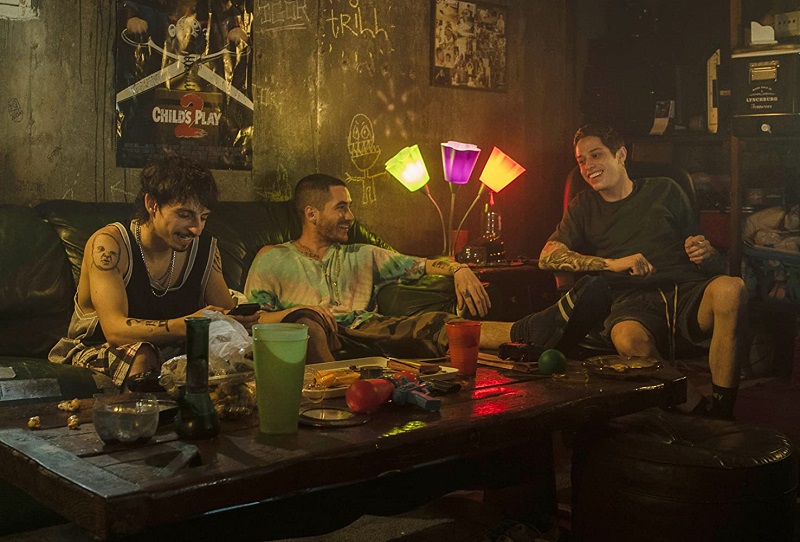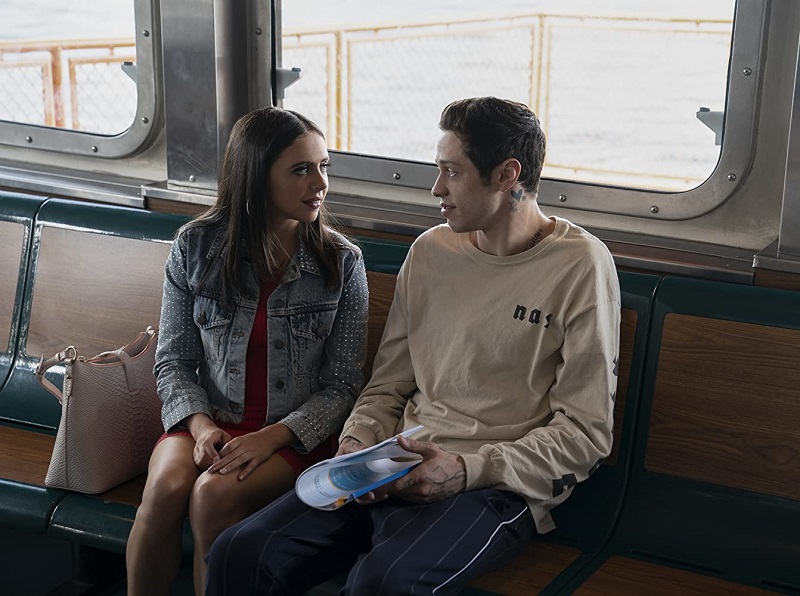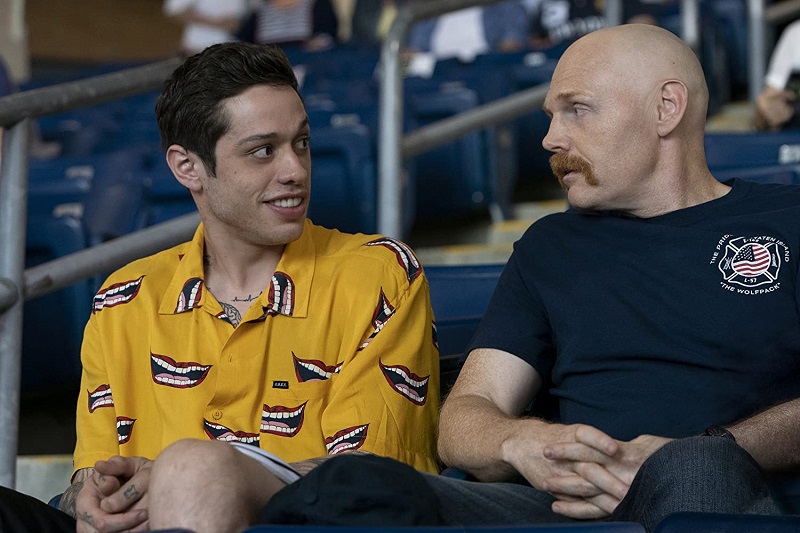With The King of Staten Island, Pete Davidson and Judd Apatow prove to be a talent tandem that is a match made in heaven. Their duo may come from varied comedic backgrounds and strengths, but their collective creative brilliancy comes through on every single frame and every single cinematic moment. Yes, it has many laugh-out-loud moments and even more smile-inducing scenes. But the surprise came by how emotively triggering the film was and from some wholly unexpected places and situations.

Davidson and Apatow (with Dave Sirus) joined forces to write a semi-autobiographical tale of Davidson’s life that is full of heart, hilarity, and priceless insight into the human condition. As most people know, Davidson’s real-life father was a firefighter who perished in the Twin Towers on 9/11. In The King of Staten Island, Chuck’s father perishes in a building fire trying to save people. Since then, he’s had trouble finding his purpose. He knows one thing: He wants to open a tattoo/restaurant, even if everyone tells him that it is a terrible idea. Chuck is running out of people to practice his art on because, well, let’s just say some of his efforts are a bit off. He even visits the tattoo parlor he hopes to intern at (run by Machine Gun Kelly unnamed soul), he gets a tough lesson in reality. He’s got work to do, and sadly, most days he just doesn’t feel like putting in the effort. Something has to happen to motivate this kid and thus far, nothing has worked. He smokes pot all day with his three friends who he’s known since elementary school and they are no different. But they are all good people.
Apatow and Davidson’s script weaves a web of friendship with these guys that is so welcomed and filled with bravado-laden honesty, including Oscar (Ricky Valez), Lou Wilson’s Richie, and Moises Arias’ incredibly well-meaning and full of heart Igor. These are the guys who ground Chuck, but they also enable him to keep the path he’s on and never veer too far from it. These fellows could have had their characterization slighted in the screenwriting process for the sake of streamlining the story. Instead, we get real and raw, three-dimensional characters who have a vested interest in not only the titular character but how the entire story will play out.
Change is happening, and for Chuck… it is not a good thing. How he reacts to it drives much of the drama of The King of Staten Island and its sublime. Each story development moment has its purpose. Although a little long in length, it becomes worth it for its ultimate payoff. This is a story about a misguided, well-meaning young man with a heart of gold, haplessly finding his way.
Lightning strikes when his Mom, Margie, finds a love connection with Bill Burr’s Ray. He’s a firefighter, which Chuck thinks is weird. There’s this whole discussion about heroes in the film and that Chuck passionately believes that heroes should not be able to have kids. He even tells his sister she’s lucky she doesn’t remember how awesome dad was, so it doesn’t hurt as much to miss him. When mom first dates Ray, there is an instant connection and it looks like Margie is going to be happy for the first time in almost two decades. Is Chuck happy for her? Hell, no. He’s a fireman! That’s sick, “didn’t you already learn that lesson.” But it doesn’t stop the pair from falling in love, all to the dismay of Chuck.
Ray puts Chuck to work during the day (after all, he doesn’t really have too much else to do) and that involves taking his young kids to school every morning and picking them up because both their parents work. At first, Chuck hates the idea. Yet the most endearing thing occurs between those kids and our anti-hero that encapsulates the feel-good nature of the entire oeuvre. The relationship that develops between Chuck and Ray’s kids is enormously adorable. It was just so touching and handled impeccably witnessing Kelly (Alexis Rae Forlenza) and Luke David Bloom’s Harold interact with Chuck. It has given him a little bit of a purpose, which was sorely missing prior. He’s able to talk to these kids and they are as honest as kids are, which is leagues different than his pals who continually encourage his musings.
How the Davidson and Apatow’s script handled the entity that is Chuck’s dad and how he perished was just stellar. There’s a complexity to how Chuck saw his dad, how other firefighters view his dad, and how Chuck’s mom memorializes her husband. How that evolves over the course of the film and Margie’s developing relationship with Ray is as organic as can be. There is a sensitivity and appreciation of firefighters here that could have us labeling The King of Staten Island a love letter to our brave firefighting heroes. All of the scenes with the firemen and women are handled with such beauty and aspirational graciousness. That brotherhood and sisterhood is a bond that is unbreakable, that comes painfully shining through the screenplay and embodied by the ensemble. When the film is over, feel free (ask first!) to hug your local firefighters.
London born Bel Powley is a find. She and Davidson have sizeable chemistry. Her Kelsey and Chuck have a complicated relationship. That “he’s just not into you” sentiment seems to be at work here. Looking closely, it is unraveled that Chuck doesn’t know how to love, to embrace adoration, and committing to being there for a person. What she sees in him, is what we see in him—even if he is completely blind to that fact. The actress (who stole scenes in the excellent AppleTV+ show The Morning Show) sees herself as a champion of all things Staten Island. She’s even going to school in Manhattan to learn about city development so she can make her home landscape live up to the love its citizens possess for it. Yes, the film is also a love letter to the often neglected New York City borough.

Speaking of a cinematic bond that elevates the movie, Marissa Tomei is Scott’s Mom, Margie Carlin. She takes the mother role that in other productions could have been a throw-away and she makes her a force of nature. First, in defending her undefendable son and second, in finding romance after 17 years with, yes, another fireman, Burr’s Ray Bishop. Their connection is immediate, even if it arrives under stressful/embarrassing beginnings. Both Bishop and Tomei are an utter joy to witness in their scenes. That was imperative for the overall arc of the film, which is mom finding someone, which proves to be the catalyst that leaves Chuck out in the dust.
There’s a supporting cast that brings such joy to the entire tone of the entire picture. Maude Apatow, the director’s daughter, plays Chuck’s sister and she’s got her act together, unlike her brother. She has several scenes with her sibling solo when he visits her at college, and it is a sibling bond that is as cinematically solid and wickedly entertaining as they come. Then, there’s the firehouse crew, who are as connected as any real-life fire crew. They are led by the veteran thespian Steve Buscemi as the unit’s paternal leader, Papa. It makes one wonder if the firefighting acting team went to firefighter school prior to filming because that strong emotional connection between the players in the firehouse is piercingly palpable. It too serves as a nice tribute to those who run in while others are running away.

What’s so special about Davidson is he somehow manages to embody the everyman who cannot find his or her way. Why they are lost, doesn’t matter. This is a generation who are living in their parent’s house, being supported by them, while they work odd jobs or try to get on their own footing. The way that Davidson achieves this entity is so approachable, even when he’s giving a 10-year-old boy a tattoo (don’t ask). See, he figures that because the kid gave consent that it’s OK. That’s our guy in a nutshell.
The King of Staten Island is firmly the film that many folks will find both great joy and inspiration. There is a lot of hurt, anger, and fear permeating our society right now. It’s not simply that laughter unites us, but the idea that we each have a purpose comes through this film loud and clear.
Davidson will absolutely garner a legion of new appreciators and fans with this performance and how he opened himself up emotionally with his contribution to the script. Sure, he is a funny and gifted comic, but the range he illustrates with this role is uncanny. It was teased earlier this year in Big Time Adolescence. He utilizes the full actor’s toolbox and does so in a manner that appears utterly effortless, even though it’s not!

Apatow has a gift as well, and that is connecting with comics and finding a way to tell their story (like Trainwreck with Amy Schumer) that is equally heartfelt as it is hilarious. Davidson and Apatow have crafted an instant classic. The film is hilarious and soulfully heartfelt and absolutely is the movie the world needs now. It is simultaneously moving, emotively gripping and surprisingly sensational!
The King of Staten Island is a charming comedic coronation of Davidson that should serve as his seismic movie star moment. It is always so welcomed when a comedy not only gives our lungs a workout from laughter but also our heart from swelling emotional fires that get fanned on film. Witnessing all these folks come together to tell this story is a true gift.
Grade: A

